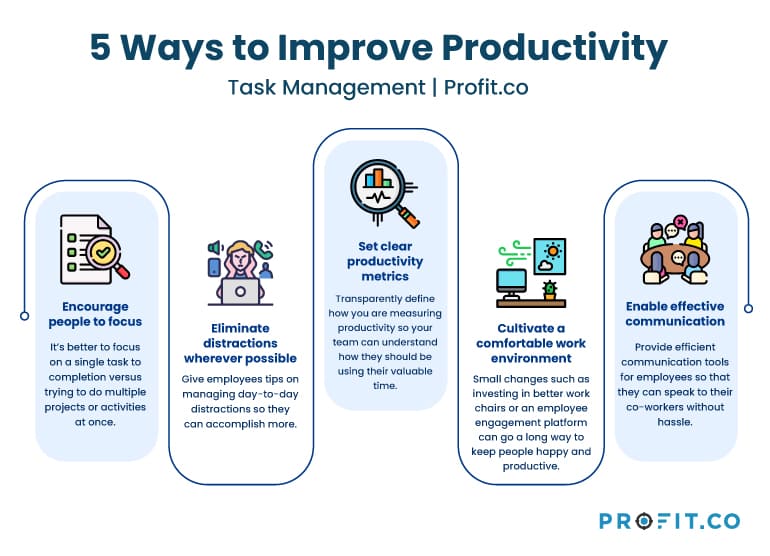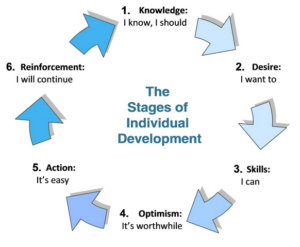 Today's world requires efficiency and hard work to outperform the competition. But even if you're not enveloped in the corporate world, productivity is something that everyone should strive to improve. Below is a list of some fundamental ways to increase productivity.
Today's world requires efficiency and hard work to outperform the competition. But even if you're not enveloped in the corporate world, productivity is something that everyone should strive to improve. Below is a list of some fundamental ways to increase productivity.
- Wake up earlier
Simple enough. The longer you're awake, the more you can accomplish. Now, that doesn't mean resort to sleep deprivation; that would be counterproductive. But waking up just an hour or two earlier can prolong the time your awake, as well as give you some quite time before anyone else has woken up. In addition, your brain is the freshest in the morning, so instead of staying up an extra two hours, wake up two hours early. In addition to the physical boost that it gives you, it gives you psychological appeasement when you reflect on how much you've accomplished despite the fact that it's only eight in the morning. For a look at how to make this change, take a look at the article "Rethinking the way we sleep."
- Exercise
Face it, any time you're trying to improve yourself in any way, be it health, mental stimulation, awareness, better sleep, etc., exercise is your best bet. Exercise increases blood flow, which boosts awareness and heightens senses. In addition, endorphins are released into the blood stream, which helps clear the morning fog and make you more alert earlier in the morning. You don't have to jog around the neighborhood or lift weights for an hour to stimulate your body. Even a brisk walk around the block and some brief stretching will help get things going. Your body just needs to energize after a long period of dormancy. Exercise combined with waking up earlier is the absolute best way to increase productivity.
- Do the easy stuff first
This is where opinions start to differ. Many people claim that finishing the most difficult projects first keeps them from looming over your shoulder for the rest of the day. While this is true, there is one major problem with this stratagem: procrastination. Starting a task is the most difficult stage. Once the mind is actively engaged in an activity, it is much easier to complete it. Therefore, if you work on the simplest projects first, it makes it much easier to start working, which then gets your mind going, making the transition to more difficult tasks easier as well. In addition, easier tasks generally take less time; that means you will be knocking things off of your to-do list at an alarming rate, which gives you a nice psychological boost.
- Minimize breaks
Although it may be difficult to work for an extended period of time, it is important not to take too many breaks and disrupt the flow of work. After all, it takes a great deal of effort to break through the morning fog and settle in to a task, so the less times you have to repeat that process the better. Athletes warm up, then compete without taking too many breaks because they don't want to warm up over and over again. Work is the same way; minimize breaks to maximize efficiency. CAUTION: avoid engaging in addictive activities during your breaks. Prime examples of this are the Internet and television. It's easy to say that you will watch one episode of Lost and then get back to work, but doing it is much more difficult.
- Set goals
Goal-oriented work is critical for productivity. Rather than waking up and thinking, I need to finish my to-do list today, break it up into segments and set goals. Individual tasks make good goals, but for larger projects, you may have to break that up into checkpoints. For example, cleaning out the garage is a daunting task, so break it down into sections. Goal number one is to organize the shoe rack. Goal number two is to stow the golf clubs. That way, you can align your breaks with goals (another example: I'll go play my guitar for 20 minutes after I finish three goals). CAUTION: avoid time-based goals. Saying that you will work for two hours and then take a break may seem like a good idea, but those two hours could expire right in the middle of a task, which disrupts the flow of work, forcing you to remember what you were doing when you left.
In addition to these five tips, experiment on your own. Keep tweaking your habits to increase productivity. After all, every person is motivated in different ways, so while some general tips may help, only you can figure out how to optimize your performance.





